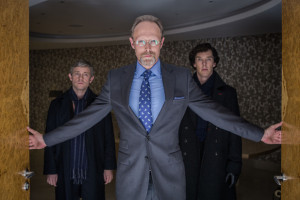Sherlock Review: His Last Vow
As with my reviews for “Hearse” and “Sign,” this one will contain a spoiler-free section followed by a marked spoiler section.
Part I: Spoiler Free
Well, twelve days later, we’re one season further in the progression of Sherlock, finished with a third series that gave us a finale that was at the same time one of the most and least traditional episodes the series has produced. Penned by writer and showrunner Steven Moffat, “His Last Vow” was, in many ways, a close re-telling of “The Adventure of Charles Augustus Milverton” — to a point.
Canon devotees will find a huge amount to love about the episode, which gave nods to Doyle both great and small, through plot events and characters. Those who have joined the fandom for the show alone will also find ample examples of what makes Sherlock great as a series.
It’s difficult to talk about this episode without spoilers, but suffice to say that Lars Mikkelsen imbues Charles Augustus Magnussen with every hateful fiber of Doyle’s master blackmailer, and in some ways, in my opinion, the connections Moffat wove between the story and characters we already love improved a great story by adding depth and suspense.
In terms of direction, “His Last Vow” wasn’t my favorite, but the superb acting and writing were enough to overcome a few confusing moments. Amanda Abbington proved once again that she can go toe-to-toe with two of the best actors in the business, and touching performances by Mark Gatiss, Louise Brealey, and the delightful Timothy Carlton and Wanda Ventham (Benedict Cumberbatch’s real-life parents) rounded out the emotionally harrowing story.
“His Last Vow” completes this season’s superb trilogy in a fitting way, bringing to a conclusion the questions it raised, and bringing us, the audience, closer to the characters we’ve come to love, all while letting us tag along with a nail-biting mystery. May Series 4 not be long behind.
Part II: Spoilers
It was frenetic; it was suspenseful; it was heartbreaking. “His Last Vow” finally gave us the truth about Mary Morstan and showed how far Sherlock Holmes is willing to go to protect his friends.
The opening nod to “The Man with the Twisted Lip” and the introduction of (Billy) Wiggins were wonderful treats for canon lovers, and the first half hour trajectory of the episode appeared to be sticking almost completely to the Doyle story–until Magnussen’s would-be shooter pulled off her face mask.
I wasn’t surprised to learn that Mary Morstan had a past, and I thought it was fitting that we never found out exactly what it was. Through her story, we learned even more completely what a truly good-hearted person John Watson is. We also learned that Sherlock Holmes has a personal vision of justice–one in which he appraises people’s characters in his own way, forgiving the woman who put a bullet through him and putting his own bullet through someone else.
I imagine there will be debate about Sherlock’s final solution to the Magnussen problem. First of all, it’s canonical. Though he doesn’t fire the bullet himself, Holmes stands by and willingly lets Milverton be killed in front of him when he could easily prevent it. Secondly, the question of the killing itself. Both in the canon and in Sherlock, Milverton is the most despicable of criminals, even more so than Moriarty. He may not have personally pulled the trigger, but he is unequivocally responsible for the deaths of hundreds, probably thousands, of people whose lives he’s ruined. He’s as close to pure evil as Doyle comes in the canon. He’s also beyond normal justice. He’s so powerful and so connected that what Holmes allows (in the story) and carries out (in “His Last Vow”) is an act that is in service to queen and country, family, and friends. He saves Mary, but he also saves the world from extraordinary evil. Does a moral question remain? Perhaps, but Doyle found Milverton worthy of death, and Sherlock chose the same course for Magnussen for the same reasons.
As I stated above, the directing of “Vow” bothered me a little bit. I missed (previous director) Paul McGuigan’s extraordinarily deft touch and found myself lost for a few seconds more than once, trying to understand the passage of time and order of events. This didn’t keep me from enjoying the episode, but I couldn’t help but think another director’s pacing and style might have done it slightly better justice.
Ultimately, thinking back to Series 1, Episode 1, “A Study in Pink,” it’s as if we’ve made an extraordinarily long and rewarding circle. “Vow” ended with Sherlock Holmes doing for John Watson what Watson did for him at the end of the beginning–eliminating his greatest threat. It left us with a Holmes who is needed in London once again to confront a familiar threat, with his best friend by his side and a brother whose love for him is made no less potent by the complications of its expression. Once again, I keep thinking of Inspector Lestrade and his elegantly simple assessment of Sherlock Holmes as a great man who might some day be good. Series 3 of Sherlock has completed the transformation, and I look forward to what’s to come.
(With special thanks to my friend @tastytrix on Twitter, who started me thinking about the circularity of Sherlock’s and John’s actions. Follow her; she’s fabulous.)
________________________________________________________________
The Detective, The Woman and The Winking Tree: A Novel of Sherlock Holmes is available from all good bookstores and e-bookstores worldwide including in the USA Amazon,Barnes and Noble and Classic Specialities - and in all electronic formats including Amazon Kindle , iTunes(iPad/iPhone) and Kobo.
The Detective and the Woman: A Novel of Sherlock Holmes is available from all good bookstores and e-bookstores worldwide including in the USA Amazon,Barnes and Noble and Classic Specialities - and in all electronic formats including Amazon Kindle , iTunes(iPad/iPhone) and Kobo.






